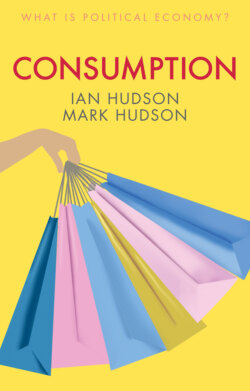Consumption

Реклама. ООО «ЛитРес», ИНН: 7719571260.
Оглавление
Mark Hudson. Consumption
Table of Contents
List of Illustrations
Guide
Pages
Series Title. What is Political Economy? series
Consumption
Copyright page
Acknowledgements
1The Meanings of Consumption
What Are We Talking About? Consumption and Political Economy
Competing Themes in the History of Consumption
The Rest of the Book
2An Aspiration for All the World: Championing Individual Freedom of Choice
Introduction
From Classical to Neoclassical Economics: Consumers as Rational Maximizers
Friendly Amendments: Alterations to the Theory with Similar Implications
Conclusion
3The System: Capitalist Consumerism. Introduction
Capitalist Commodity Production: Naming the System
Commodity Fetishism
Consumption and Jobs
The Evolution of Capitalist Commodity Consumption in the US after World War II
Conclusion
4Private Choices, Social Problems. Introduction
What You Don’t Know Might Hurt You: Information Asymmetry
You’re Not as Clever as You Think: Behavioural Economics
Relative Consumption
Created Wants
The Androcentric Consumer
Conclusion
5The Shopocalypse?
“Ten Ways to Reduce Your Impact”
Blindfolded
Bloated: The Problem of Scale
Embedded Consumption and the Limits of Consumer Environmentalism
Conclusion: Consumption as Ecological Practice
Note
6Consumption, Power and Liberation
Class and Consumption
Consumers of the World, Express Yourselves!
Consumption and Gender
7Shopping Police
Shopping as Power
Easy on the Surface, Hard Underneath
Terror of the CEO?
Saviour of the Worker, Farmer or Forest?
Too Much to Bear: The Trials and Tribulations of a Label
The Commodification of Politics?
Conclusion
References
Index
POLITY END USER LICENSE AGREEMENT
Отрывок из книги
Ian Hudson
Mark Hudson
.....
Consumerism was also often at odds with the strong influence of tradition, often reinforced by legal constraints on consumption (Stearns, 2001: 4–9). Sumptuary laws that restricted what people were allowed to own were placed on a shockingly wide range of goods: in fourteenth-century Venice, tapestries could not measure more than 1.5 meters and gilded fireplace furnishings were outlawed; in the late 1500s in England, “gentlemen entering London had their swords measured and broken if they were too long for their status” (McCabe, 2015: 24). Depending on your interpretation, these laws were in place either to protect people from overspending on fads or to ensure that consumption was a visible marker of the existing social hierarchy (Shammas, 2012: 212). The justification for sumptuary laws often used the anti-consumption language of the “sin of luxury” and the economic dangers of “extravagance” (Hunt, 2003: 64). By the seventeenth century these laws gradually began to disappear. Although some types of consumption (for example, drugs and prostitution in many countries) are still outlawed, these restrictions are rarely designed to reinforce social hierarchies. A consumer society was not present before the 1700s for three reasons: consumers were a small minority, new items were not consistently generated, and consumerism was criticized as a moral failing because it ran counter to tradition (Stearns, 2001: 8–9).
Transformationists can make similar claims about the changes surrounding consumer credit. While credit has a very long history, the social attitudes about both lending and borrowing have changed drastically. Charging interest on loans – called usury – was frowned on by most religions. It was punishable by excommunication in the Catholic Church and is still forbidden in Islam. Judaism permitted charging interest to those from other religions, and so some Jews (who were often banned from other occupations) earned their income by lending money, a practice that was often viewed by Christians with considerable distaste. Christianity gradually relaxed its strict prohibitions so that usury came to mean charging unreasonably or immorally high interest rates (Wiedenhoft-Murphy, 2016). On the borrower side, although aristocrats would frequently go into debt using the collateral of their good name and the poor were often forced into debt to purchase staples, in the nineteenth century being a debtor was seen as a bit shameful (Stillerman, 2015). As we will discuss in chapter 3, the negative stigma of borrowing began to wane in the twentieth century, so that one might argue that, currently, it is completely acceptable never to be free of debt.
.....